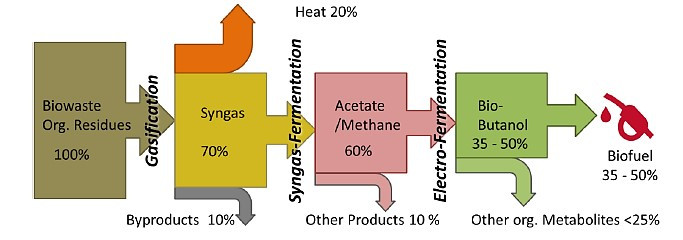BesTECH: Bio-Electric Syngas Technology for the Production of Biomass Derived BioFuels and Platform Chemicals
Recent findings indicate that electro-fermentation provides an efficient tool to influence bacterial metabolism and product formation. The project BesTECH aims at developing an electrically enhanced bioconversion process to establish a biotechnological platform that can provide sustainable, safe and environmentally friendly biofuels and -chemicals on a biomass basis.
The first step is to convert biomass feedstocks of varying or minor quality into syngas or biogas. The subsequent step, syngas fermentation, is a hybrid thermochemical / biochemical platform that takes advantage of the simplicity of the gasification process and the high specificity of the fermentation process, to deliver bio-based products. Biomass and other carbonaceous materials can be gasified to produce syngas with high concentrations of CO, H2 and CO2. Such low cost feedstock materials include waste wood, agricultural residues and byproducts, municipal organic wastes and wastes from the pulp and paper industry.
Syngas fermentation combined with the new and highly promising technology of microbial electrosynthesis enables to convert carbon building blocks (CO2, CO and acetic acid) into higher value products, serving as biofuels or biochemicals. The focus is to optimize the biotransformation of gaseous substrates into long chain fatty acids and alcohols (e.g. caproic acid, butanol, hexanol, 1,2-butandiol) and methane as final products. Testing improved gas fermenters and optimized electrode designs are essential tasks, as well as selecting the best suitable microbial production strains.
Syngas fermentation converts the generated gaseous compounds to alcohols and organic acids (mostly ethanol and acetic acid) by utilizing chemoautotrophic microorganisms that can metabolize gaseous substrates (Figure 1).

Figure 1: Proposed conversion of biomass through a cascade of conversion technologies: gasification, biological syngas- and electro-fermentation.
Innovation beyond state-of-the-art
The highly advanced concept of electro-fermentation is still dependent on complex carbon substrates of high purity (e.g. sugars, starch, and glycerol). By coupling it with a new approach, syngas fermentation, it is possible to efficiently valorize almost any kind of low cost biomass residue and by-product. As additional advantage, the thermal pyrolysis into syngas and subsequent de-novo synthesis of bio-based products provides a highly efficient barrier by which we can prevent spreading of potentially harmful substances, that might occur in organic waste fractions like pesticides, antibiotics and endocrine disruptors. Low-quality biomass that is upcycled to high-quality products, via the novel conversion route of microbial electrosynthesis, allows forming targeted products and building blocks from previously decomposed carbonic matter. Thus, the BesTECH strategy uniquely contributes to a circular waste biomass-based economy. It develops fundamental knowledge on microbial production strains and how their metabolic activity can be steered via electric redox shifts. Moreover, technical reactor design is targeted to overcome current limitations of fermentative approaches such as product inhibition, unspecific products and low conversion rates.
.jpg)
Projektvolumen
EUR 899.458,--
Projektlaufzeit
2020-04-01 - 2024-12-31
Supported by
ERA-NET Bioenergy
Projektpartner
BOKU
Huber4Zero LAB
IOS-PIB
